
web3 infrastructure
Validator Uptime in Staking: Complete 2025 Guide
From rewards to network trust, validator uptime drives staking performance. See why institutions demand 99.99%.
SEP 11, 2025
Table of Contents
Validator Uptime Explained: Definition & Importance in Staking
Validator Uptime SLA: Why Reliability Matters for Staking Rewards
Risks of Downtime and Slashing
How Everstake Achieves 99.99% Uptime
Uptime as a Competitive Advantage
Solana Validator Uptime Case Study
Future of Validator Uptime in Staking
Conclusion
FAQ
Share with your network
In Proof-of-Stake blockchains, validator uptime is a critical measure of efficiency and reliability. For delegators, selecting a validator that stays consistently online and secure helps maintain network performance and trust.ґ
Everstake has built its reputation on enterprise-grade infrastructure and operational discipline, consistently maintaining near-perfect uptime of 99.99%. This guide explains why uptime matters, how it’s measured, and what sets professional validators apart.
Validator Uptime Explained: Definition & Importance in Staking
In a PoS ecosystem, a validator’s primary role is to propose and attest blocks, for which purpose it needs to stay online and in sync with the network 100% of the time. Any downtime may lead to missed blocks, and therefore lost rewards or even slashing, if the network rules suggest that.
Particularly, this means that the importance of uptime spreads across several fundamental dimensions, all of which are crucial both for delegators and validators.
- Rewards are distributed based on performance. A validator with higher uptime validates more blocks, thereby earning more for its delegators. Even small amounts of downtime can cause measurable reductions in annualized yield.
- Validators secure the network by ensuring consensus is maintained. High validator uptime helps prevent network instability and increases confidence in the chain’s resilience.
- Some PoS blockchains impose slashing penalties when validators are offline or misbehave. Downtime or double-signing can result in lost funds for both validators and their delegators.
These factors alone make uptime a direct indicator of validator performance, reliability, and trustworthiness.
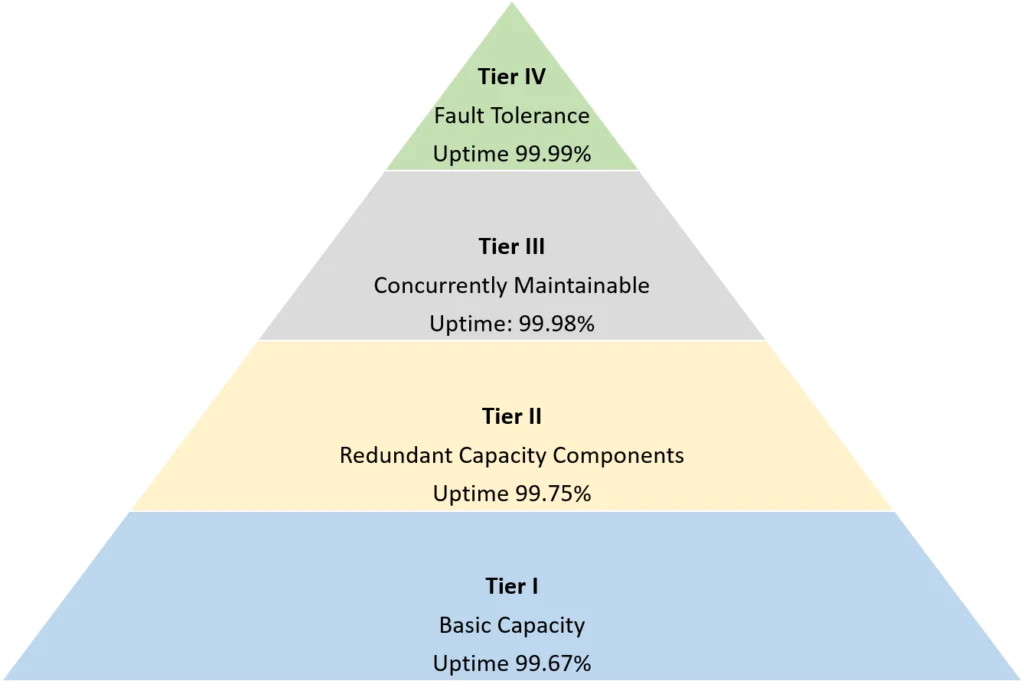
Validator Uptime SLA: Why Reliability Matters for Staking Rewards
In enterprise IT, Service Level Agreements (SLAs) define the expected uptime and reliability of a service provider. The blockchain space is increasingly moving in the same direction, especially as institutions explore staking as part of their portfolio strategy.
A staking validator uptime SLA effectively communicates to delegators and institutional partners that:
- The validator operates with enterprise-grade reliability.
- Infrastructure has redundancy and failover mechanisms.
- Monitoring and incident response processes are continuously updated and are always in place.
Professional validators such as Everstake have made validator services’ uptime guarantees part of their offering. By consistently achieving 99.99% uptime across multiple networks, they present a level of operational assurance that aligns with institutional requirements. For institutional stakers, such commitments are critical for risk management and compliance.
(T – D) / T x 100 = Uptime Percentage
Formula for calculating uptime: T stands for total time, D for downtime
Risks of Downtime and Slashing
To understand why uptime is non-negotiable, one must consider the financial and security consequences of downtime.
- Lost Rewards: When a validator misses blocks, rewards are reduced. For large-scale delegations, even a fraction of a percent in yield loss can translate into significant financial impact over time.
- Slashing Events: On chains like Ethereum or Cosmos, downtime or misconfigured nodes may lead to slashing. This means not only missed rewards, but actual loss of principal for both validator operators and delegators.
- Reputational Damage: Validators that fail to maintain high uptime quickly lose delegators. Trust is difficult to regain once a history of unreliability is established.
Solana is a particularly relevant example. Solana staking validator uptime is a major performance metric because the network demands exceptionally high throughput. Even short outages on Solana can have outsized consequences, both for rewards and for network stability.
How Everstake Achieves 99.99% Uptime
Maintaining uptime at the “four nines” level requires more than reliable internet or a well-configured server. It is an entire operational philosophy that includes redundancy, automation, node monitoring, and human expertise.
Everstake achieves the best validator uptime provider status by applying proven enterprise practices to blockchain infrastructure. The following pillars are central to their approach:
Enterprise Infrastructure
Validators are deployed across multiple data centers with geographical distribution, while hardware is chosen for resilience, with redundant power, cooling, and connectivity. Finally, failover mechanisms ensure uninterrupted service even in the event of hardware or network issues.
Monitoring & Alerting
Everstake ensures continuous node monitoring, network connectivity, and performance. At the same time, automated alerts and remediation systems reduce mean time to recovery (MTTR). Additionally, predictive analytics help identify and mitigate issues before they cause downtime.
Security at Every Layer
At Everstake, strict access controls, encryption, and firewalls protect validator keys and infrastructure, while hardware Security Modules (HSMs) are used to safeguard signing keys. Regular penetration testing and audits reduce vulnerability exposure.
Operational Expertise
A dedicated 24/7 team of Everstake DevOps and security engineers maintains nodes using incident response protocols that ensure rapid recovery from unexpected events. The continuous improvement cycles enhance systems based on operational feedback.
Compliance & Transparency
Enterprise customers normally require transparency in performance metrics, and Everstake provides clear reporting on uptime, rewards, and security practices. This transparency builds confidence for institutional actors. On top of that, Everstake is ISO/IEC 27001:2022, SOC 2 Type 2 certified, NIST CSF, ISO27001:2022, ITGC, CCPA, as well as well as fully GDPR compliant.
Uptime as a Competitive Advantage
The staking ecosystem is growing more mature and professional as the DeFi and related PoS-based realms gain more steam and traction, while user-focused services like the ETH staking calculator become more prominent. These conditions are the core reason uptime is becoming a key differentiating factor in estimating their proficiency. Provable and verifiable metrics and efficient performance drive delegators’ choice these days.
- Thanks to thought-out security and regulatory transparency, professional validators who consistently deliver high uptime can continually ensure higher rewards, institutional confidence, and overall peace of mind.
- Everstake’s reputation as the best staking validator uptime provider is thus backed by years of measurable reliability across dozens of networks.
| Regulated Enterprise-Grade Staking | Solo Staking | Non-Regulated Staking Services | |
| Target Users | Institutions, funds, banks, enterprises | Individual crypto holders with technical skills | Retail players, DAOs |
| Regulatory Status | Licensed, compliant with financial regulations (KYC/AML, audits, reporting) | No regulation, fully self-sovereign | Usually unregulated or offshore, with minimal compliance |
| Infrastructure | Institutional-grade, audited, redundant systems with SLAs | User’s own hardware/software (home node, cloud server) | Cloud-based, custodial, or semi-custodial |
| Security | Professional custody, insurance, slashing protection, multi-sig setups | Fully dependent on the user’s setup; risk of misconfigurations | Security depends on the provider; it may lack audits or insurance |
| Control of Funds | Client maintains beneficial ownership, often with segregated wallets | Full control of keys & funds | Often custodial; users may not fully control funds |
| Rewards | Optimized uptime, transparent reporting, and competitive rewards | Full rewards (minus network fees) | Rewards may be higher, but with hidden fees or risks |
| Risks | Low operational risk; regulatory overhead; counterparty risk if custodied | Risk of slashing, downtime, hardware failure, lost keys | High counterparty risk, possible exit scams, and regulatory crackdowns |
| Operational Effort | Outsourced to a professional provider | High (setup, updates, monitoring, troubleshooting) | Low for user, but opaque provider operations |
| Transparency | Full audits, regulatory disclosures, service-level reporting | Complete transparency (self-operated, all on-chain) | Often opaque, limited, or no reporting |
| Costs | Service fees (professional infrastructure, compliance overhead) | Hardware, electricity, technical expertise, time | Provider fees, spreads, and possible hidden costs |
| Best For | Financial institutions, enterprises needing compliance & reliability | Technical individuals seeking maximum self-sovereignty | Retail users seeking convenience but willing to take risks |
Ready to launch your validator with 99.99% uptime? Get started with our institutional staking.
Solana Validator Uptime Case Study
Validators on Solana must process thousands of transactions per second, and even small performance deterioration can bring about missed leader slots and reduced rewards. This alone makes uptime a matter of crucial importance in this blockchain.
Everstake’s Solana staking validator uptime consistently ranks among the top in the ecosystem. This is achieved thanks to the following solutions deployed and implemented for the company’s Solana validators.
- Optimized hardware tailored specifically to Solana’s performance requirements.
- Ultra-low latency connectivity to minimize block propagation delays.
- Real-time monitoring to detect and address network synchronization issues.
Everstake uses infrastructure that is specifically designed for Solana’s environment, thus securing near-perfect uptime, consistent rewards, and playing one of the key roles in ensuring the network’s overall stability.
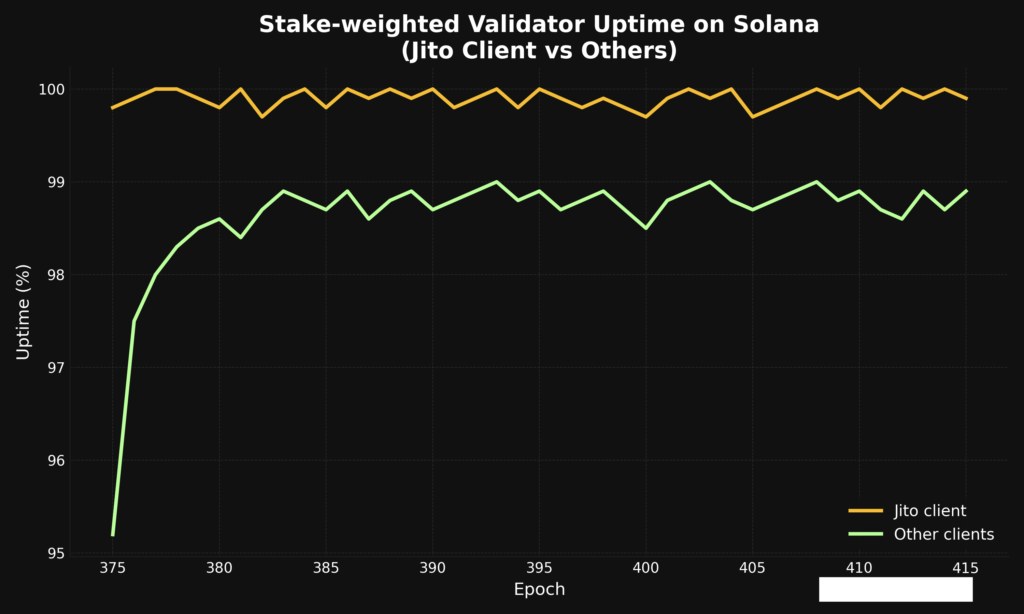
Future of Validator Uptime in Staking
As enterprise staking matures, institutional players are increasingly exploring it as a yield-generating strategy. That said, their requirements differ significantly from those of retail delegators. The institutional expectations usually include the following fundamental notions.
- Formal SLAs on uptime and performance.
- Security guarantees and compliance with regulatory standards.
- Detailed reporting and transparency.
The ability to ensure all that and more is what distinguishes a professional validation services provider from a minor validator. Everstake’s enterprise staking offering fully observes institutional-grade requirements and combines validator services’ uptime guarantees with the security and reporting features that regulated entities normally demand.
The growing institutional interest in enterprise staking signifies the increasing importance and maturity of the sector. In these new conditions, only the validators capable of showing high levels of performance and trustworthiness will be able to secure major delegations from institutional players.
As more value flows into Proof-of-Stake networks, uptime and reliability will become even more critical. Professional validators have already outlined particular expectations for the near-term developments.
- Delegators may increasingly demand formal uptime guarantees as a prerequisite for delegation.
- Public dashboards and third-party audits will make uptime performance more visible.
- Institutional staking will rely on validators who can integrate with regulated custodians while maintaining high uptime.
This means the high staking validator uptime will gradually become a basic expectation rather than a competitive edge. Thus, only operators who consistently deliver 99.99% reliability and beyond will remain competitive in this environment.
Book a demo with Everstake to secure institutional staking.
Conclusion
Validator uptime is at the core of staking performance, security, and trust: it is one of the fundamental guarantees that delegators will not miss out on rewards, networks will remain properly secured, and institutions will have all the confidence to participate in staking ecosystems without exposing themselves to many risks.
Everstake ensures 99.99% uptime across numerous blockchain networks thanks to the employment of enterprise-grade infrastructure, continuous and thorough monitoring, audit-readiness, and clear uptime guarantees. These practices are what made us a reliable partner for individual delegators and institutions alike.
FAQ
What is a good validator uptime?
A good validator uptime is at least 99.9%, with 99.99% uptime considered the industry benchmark for reliable staking performance.
How is validator uptime calculated?
Validator uptime is calculated as: (Total Time – Downtime) / Total Time × 100, showing the percentage of time the validator stays online and synchronized with the network.
Why does 99.99% uptime matter in staking?
99.99% uptime ensures validators remain consistently online, which is critical for network reliability, institutional trust, and long-term staking performance.
Which validator has the best uptime?
Professional providers like Everstake maintain near-perfect uptime of 99.99% by using enterprise-grade infrastructure, redundancy, and 24/7 monitoring.
***
Everstake is a software platform that provides infrastructure tools and resources for users but does not offer investment advice or investment opportunities, manage funds, facilitate collective investment schemes, provide financial services, or take custody of, or otherwise hold or manage, customer assets. Everstake does not conduct any independent diligence on or substantive review of any blockchain asset, digital currency, cryptocurrency, or associated funds. Everstake’s provision of technology services allowing a user to stake digital assets is not an endorsement or a recommendation of any digital assets by it. Users are fully and solely responsible for evaluating whether to stake digital assets.
Share with your network
Related Articles
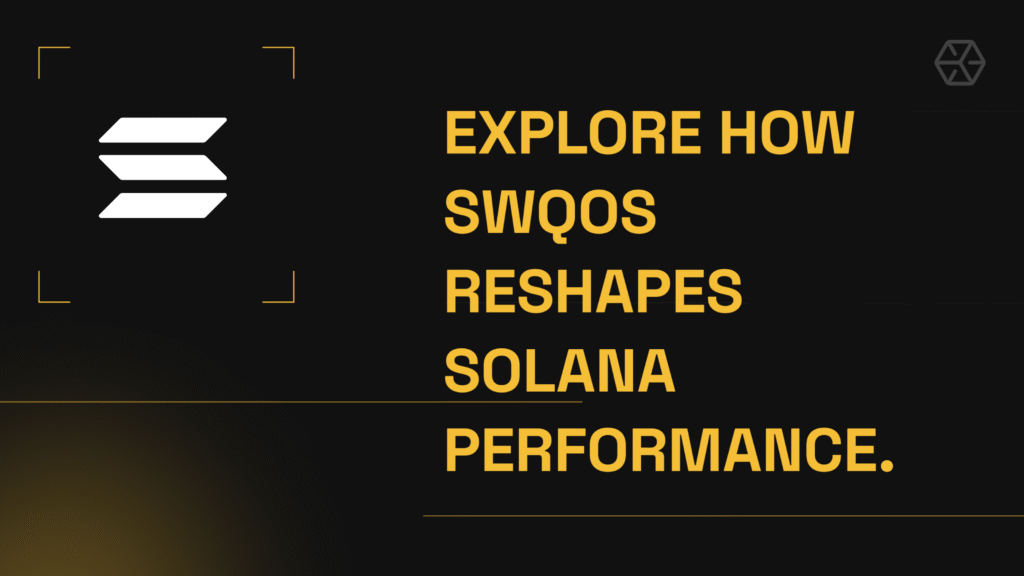
web3 infrastructure
SWQoS (Stake-Weighted QoS): A New Standard for Solana RPC Access
Public RPCs aren’t built for institutional scale. Learn how the best Stake-Weighted QoS transforms Solana into a network where performance is guaranteed, not assumed.
OCT 11, 2025
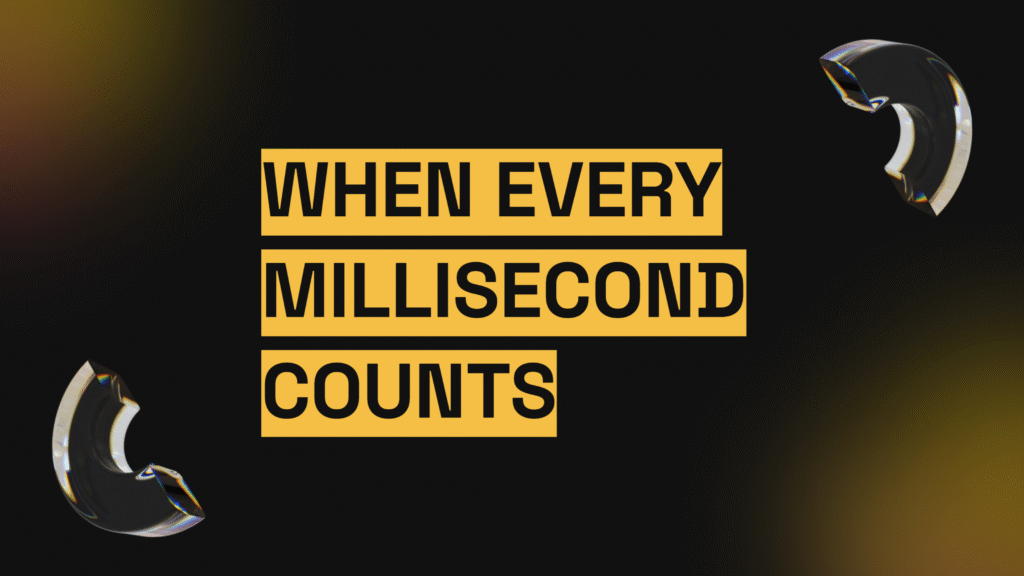
web3 infrastructure
Solana ShredStream: Ultra-Low Latency Data for Institutions
In Solana high-frequency trading, DeFi, or institutional validation, information latency’s importance is paramount, which makes access to raw shreds in real time essential. Everstake’s Solana ShredStream delivers exactly what is expected by high-stakes traders or institutions: ultra-low latency and enterprise-grade data services designed to power sophisticated use cases. This article explains Solana ShredStream, how Everstake...
SEP 25, 2025
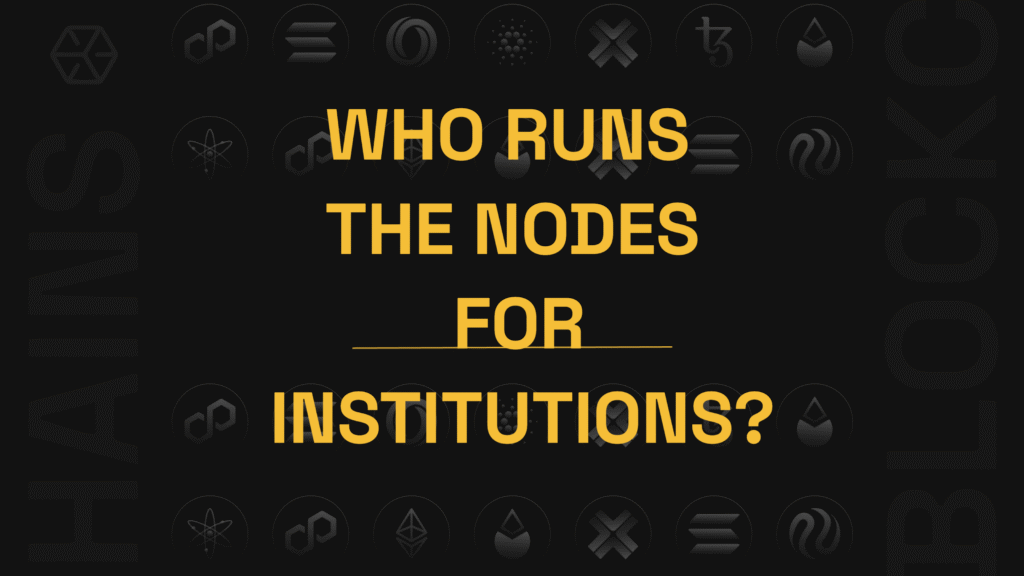
web3 infrastructure
Best Validator-as-a-Service (VaaS) Providers for Institutions
Institutions are turning to validator-as-a-service. But which providers truly deliver on uptime, security, and compliance?
SEP 16, 2025
Disclaimer
Everstake, Inc. or any of its affiliates is a software platform that provides infrastructure tools and resources for users but does not offer investment advice or investment opportunities, manage funds, facilitate collective investment schemes, provide financial services or take custody of, or otherwise hold or manage, customer assets. Everstake, Inc. or any of its affiliates does not conduct any independent diligence on or substantive review of any blockchain asset, digital currency, cryptocurrency or associated funds. Everstake, Inc. or any of its affiliates’s provision of technology services allowing a user to stake digital assets is not an endorsement or a recommendation of any digital assets by it. Users are fully and solely responsible for evaluating whether to stake digital assets.
Sign Up for
Our Newsletter
By submitting this form, you are acknowledging that you have read and agree to our Privacy Notice, which details how we collect and use your information.